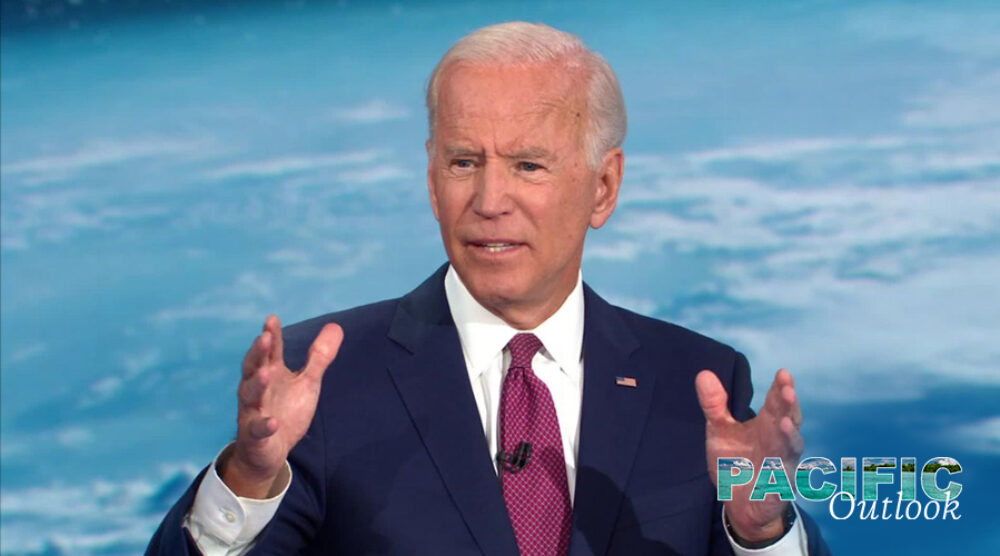Pacific island states hope to work with a new administration in the White House to galvanise global action on climate change, writes Wesley Morgan.
Fiji’s prime minister, Voreqe Bainimarama, was the first to congratulate Joe Biden on his election as president of the United States. There was little doubt what he wanted from the next leader of the free world. “Together, we have a planet to save from a climate emergency”, he tweeted. Bainimarama realised that Pacific island countries had just gained a powerful ally in the global fight to tackle climate change. Not only has Biden promised to recommit the US to the Paris Agreement, but also to “lead an effort to get every major country to ramp up the ambition of their domestic climate targets”. Bainimarama quickly followed up with a formal letter, inviting Biden to attend the annual Pacific Islands Forum in mid-2021. In the age of COVID-19, leaders may end up meeting online, which would make it easier for world leaders to attend. Even if Biden does not attend the regional leaders’ meeting—which is scheduled to be held in Fiji’s capital Suva, with Bainimarama due to take on chair of the Forum—the US will likely send a senior figure. This may well be a key moment to renew US engagement with Pacific countries, with the Pacific Islands Forum expected to set out a long-term vision for regional cooperation by declaring a ‘2050 Strategy for the Blue Pacific’.
Pacific island countries have previously worked with the United States to galvanise climate action. In 2015 for example, Pacific diplomats worked with US counterparts to build support for the Paris Agreement—the first global climate treaty. Meeting in Hawaii in 2016, Obama told Pacific leaders “we could not have gotten a Paris Agreement without the incredible efforts and hard work of the island nations … they made an enormous difference”. Pacific island states will be hoping to again collaborate with the US to strengthen commitment to the Paris Agreement. At next year’s UN climate summit, countries are expected to pledge stronger targets to reduce emissions and to set out plans for long-term decarbonisation of their economies. Pacific island countries are heartened by Biden’s commitment to achieving net zero emissions, and hope to work with the new US administration to press other countries to put forward similar targets. This could prove awkward for Canberra, with Australia so far refusing to join other countries in the Asia-Pacific—including New Zealand, Japan, South Korea and even China—who are pledging net-zero mid-century climate targets.
In addition to climate change, other security issues are likely to be high on the agenda. The Pacific islands are increasingly important to the US in the context of geostrategic competition with China. In recent times there has been concern that Beijing has been making inroads at the expense of traditional powers like the US, Australia, and New Zealand. Of most concern has been the prospect that China might leverage large infrastructure loans to secure a Chinese naval base in the Pacific. While there seems little prospect of that, Pacific leaders will nonetheless welcome a renewed US engagement in the region, to help tackle the impacts of climate change and recover from the impacts of the COVID-19 pandemic. Island leaders will also welcome US support for the construction of new infrastructure in the Pacific islands and will look to the US for help to manage their large maritime zones and to secure the region’s valuable fisheries. As Bainimarama explained in his congratulations to Biden: “we welcome a strong American presence in the Pacific to help maintain a peaceful and secure Blue Pacific”. A ‘BLUE Pacific Act’ was introduced in the US Congress earlier this year. Put forward by a bipartisan ‘Congressional Pacific Islands Caucus’ (a new grouping of US legislators), the bill proposes a long-term framework for US foreign policy in the Pacific islands focused on “security, development and shared-values”. If revisited and passed by the next Congress, the BLUE Pacific Act will see an expansion of US diplomatic presence in the region, and a significant boost to aid and security cooperation with Pacific island states.
Finally, the appointment of Kamala Harris—the first person of colour, or woman, to become US vice-president—will also be celebrated by many in the Pacific. As with other parts of the world, women still face many barriers to political power in the Pacific islands, and Harris will be seen as an inspiration for change. In Fiji in particular, which has a large Indian-diaspora community, Harris will be embraced for her Indian heritage and her success as the daughter of a migrant family. For her part, Harris describes black women as the ‘backbone’ of American democracy. While there have been governance challenges in the post-independence Pacific, the region remains committed to norms of liberal democracy, and the election of both Biden and Harris will be seen as a beacon of hope to many.
AUTHOR
Dr Wesley Morgan is Adjunct Research Fellow with the Griffith Asia Institute, and a member of GAI’s Pacific Hub.
The Pacific Outlook series is an initiative of the Pacific Hub.








